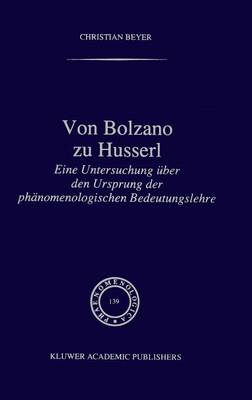Phaenomenologica
1 total work
v. 139
This text contains a detailed study of the historical and systematical origin of Edmund Husserl's views on meaning as manifested in his influential work, "Logical Investigations" (1900-01) and "Ideas" (1913), relating them both to Bernard Bolzano's theory of the relationship between logical experiences and their objective contents (from his 1837 "Theory of Science") and to Hermann Lotze's theory of ideas (from his 1874 "Logic"). The author clarifies the basic concepts of Husserl's theory of meaning and shows that it is Platonic (rather than Aristotelian) in spirit. Furthermore, he defends an "identificationalistic" interpretation of Husserl's central notion of "noematic X" and outlines a Husserlian contribution to the "externalism/internalism" debate in recent analytic philosophy. The book is aimed at philosophers of language, mind and logic with either a phenomenological or an analytic background, Husserl scholars, and historians of 19th- and 20th-century philosophy.
